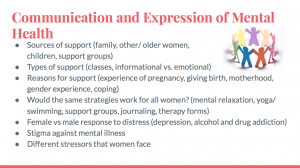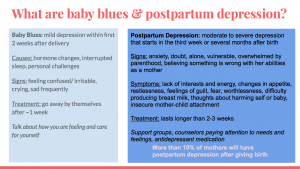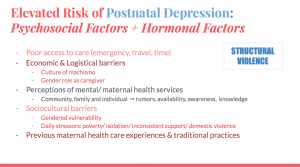"In 1985, Maine and Rosenfield asked a pivotal question: Whereʹs the ʺmaternalʺ in ʺmaternal-child healthʺ? Why were we only focused on mothersʹ capacity to improve or endanger their childrenʹs health, rather than on the health of mothers in their own right?" Unsafe Motherhood: Maternal Mortality and Subjectivity in Post-War Guatemala, Nicole Berry
We must first ask how do women, mothers specifically, express their emotions? To whom do they express them to and look for support? One maternal mental illness this research focuses on is postpartum depression.
Studies indicate that women’s health care-seeking behaviors during pregnancy are influence by: poor access to care, economic barriers, individual and community knowledge and acceptance of maternal health services, partner support, previous maternal health care experiences, & the degree of communication with other women and health workers
How do women, in particular, express their emotions/ mental health?
What are postpartum depression & baby blues?
Do Nicaraguan women have an elevated risk of postnatal depression (according to U.S. research on PPD)?
It appears as if the answer is yes, as elevated risk for PPD is determined by the hormonal factors of pregnancy (which we can assume to be universal) and psychosocial factors. These psychosocial factors would be particularly negative due to structural violence in Nicaragua.
"Rural women have complex stakes in the promises of intervention, in the ideas and languages that package health intervention."
- Sarah Pinto, Where There Is No Midwife
"Access" here is complex, involving unavailability as well as affects associated with hegemonic surveillance and moral subjectivities associated with privatization, commodification, and the flows of late capitalism. Yet the fantasies of outside power on which many interventions rely for their authority demonstrate a deeply rooted locality"
- Sarah Pinto, Where There Is No Midwife
The infographic above should provide the overview needed to better understand the psychosocial factors affecting Nicaraguan women. Two that I would particularly like to elaborate on are perceptions and the gender/ power dynamic.
Perceptions: Speaking with Eva and all of the research thus far has indicated that most of how new mothers know how to navigate the birthing process and postpartum care is by mouth from their mother and/or mother in law. As a result, perceptions and prevailing rumors of other women's experiences greatly affect a new mother's healthcare seeking behavior. Some rumors and false information have been identified in the literature to include fears of being touched or examined by health care workers, that going to a health clinic guarantees birth by cesarian section, that by being in a health facility or taking medication it is actually more likely for a mother to become ill, and the costs of delivery care services. A mother's knowledge of pregnancy and delivery practice comes from health workers, prior experience, and from other more experienced women in the community. In many ways, it all boils down to communication.
Gender/ power dynamics: In a culture with prevalent machismo, women are kept to a socially constructed gender role as the primary caregiver. With this role comes a huge burden (emotional, financial, quality of life) that likely affects her mental health. Additionally, women are often immediately subordinate and therefore are dependent on men not oney economically, but also in whether they have time for themselves and their needs. This means that not being at work for an extended period of time postpartum would be difficult and that she must be ready to fulfill her responsibilities to her other kids she is likely to have at home and the general needs of the household.
Because there is so little published on Nicaragua, I am unclear of how much emotional support the present mother or mother-in-law provides to the new mother and how that affects the mental health of a mother postpartum even in the most difficult situations.


